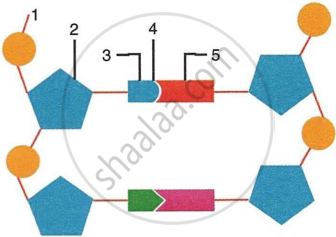Advertisements
Advertisements
प्रश्न
State the difference between:
Chromosome and chromatid:
उत्तर
A chromosome is an organized structure of DNA and protein found in cells. It is a single
piece of coiled DNA containing many genes, regulatory elements and other nucleotide
sequences whereas a chromatid is one of the two copies of DNA making up a duplicated
chromosome, which are joined at their centromeres, for the process of cell division (mitosis
or meiosis).
APPEARS IN
संबंधित प्रश्न
State the exact location of the Centromere
Name the following:
The number of chromosomes present in a nerve cell of a human being.
What are genes?
Given below is a schematic diagram of a portion of DNA.

- How many strands are shown in the diagram?
- How many nucleotides have been shown in each strand?
- Name the parts numbered 1, 2, 3, 4 and 5 respectively.
- Name the DNA unit constituted by the parts 1, 2, 3 collectively.
During the pairing of chromosomes in meiosis, the ________ chromosomes come to lie side by side.
Chromosomes are mainly made up of ______.
Choose the correct answer:
Chromosome is most coiled at (in mitosis) ____________
Mention the contribution of the scientist given below in the study of chromosome:
Strasburger
Choose the correct answer:
A 'V' shaped chromosomes has to _____________
Give a reason for the following:
Gametes must be produced by meiosis for sexual reproduction.
Differentiate between
Cytokinesis in plant and animal cell
Give Technical Terms
The stage when sister chromosomes separate from their paired condition.
Complete the following sentence with appropriate word :
The pairing of homologous chromosomes is called _______.
Name the following:
The pattern of arrangement of genes along a chromosome.
Identify the odd one:-
Small swellings on the surface of the chromosome are called______.
The chromosomes are duplicated in ______.
Define the following term:
Chromatid
Rewrite the correct form of the statement by changing the first or last word only:
Duplicated chromosomes remain attached at a point termed as centrosome.
